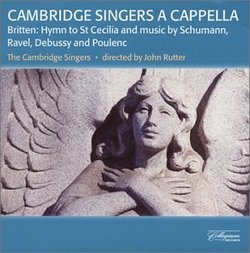International a cappella
FrKurt Messick | Bloomington, IN USA | 01/17/2006
(5 out of 5 stars)
"It may seem somewhat strange for the Cambridge Singers to entitle a piece 'A Capella', given that almost all of their music performance is a capella. However, in this collection, they are performing a repertoire from composers whose usual fare is not a capella composition. This was performed in one of their regular recording haunts, the Great Hall of University College School, London, in 1992.
--Music--
The music here comes from composers in Germany, France and England from the nineteenth and twentieth centuries. During the preceding Classical period, very little music was composed for choir/choral groups alone, and it wasn't until the Romantic period that revived interest in a capella music inspired compositions from composers such as those represented here. The twin influences of madrigal societies in Britain and the Cecilian movement on the continent helped fuel the drive for more a capella music.
From England and Germany, the Cambridge Singers perform pieces by Benjamin Britten, Johannes Brahms, Robert Schumann, R. L. Pearsall and Frederick Delius. From France, they perform the music of Maurice Ravel, Claude Debussy, and Francis Poulenc. The influences of both Classical times as well as earlier folk songs, chansons and even sacred polyphony figure into the compositions to some degree.
The performances are solid, occasionally stellar. The voices are graceful and lovely, perhaps only occasionally dropping in energy a bit, but always recover nicely.
--Liner Notes--
The notes include an introduction to the CD, a listing of the tracks with composer, arranger and lyrics, together with a brief paragraph about the history of the piece. Where lyrics are in other languages, an English translation is provided. There is a listing of the performers of the Cambridge Singers, but no description of the group, nor biographical information about John Rutter.
--John Rutter--
Rutter was born in London and educated at Clare College, Cambridge. This was where his career as a composer, arranger and conductor began. His early work was with groups at King's College Chapel at Cambridge as well as the Bath Choir and Philharmonic Orchestra. He has worked for the BBC providing music for educational series such as 'The Archaeology of the Bible Lands', until in 1979 he began forming the Cambridge Singers, and has continued a remarkable career of performance and recording as their director ever since.
--The Cambridge Singers--
The Cambridge Singers are a mixed choir of voices, many of whom were members of choir of Rutter's college, Clare College, Cambridge. While they specialise in English and Latin liturgical pieces, they have a wide range of recordings that span from modern compositions (including a remarkable requiem by Rutter) to English folk songs of the Middle Ages. Many are former members of the choir of Clare College and other Cambridge collegiate choirs (hence the name, Cambridge Singers). In the quarter-century since the founding, the Cambridge Singers have produced an impressive body of recordings.
This is a splendid recording.
"


 Track Listings (8) - Disc #1
Track Listings (8) - Disc #1